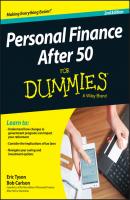Personal Finance After 50 For Dummies. Tyson MBA Eric
Чтение книги онлайн.

Читать онлайн книгу Personal Finance After 50 For Dummies - Tyson MBA Eric страница 4
Название: Personal Finance After 50 For Dummies
Автор: Tyson MBA Eric
Издательство: John Wiley & Sons Limited
Жанр: Зарубежная образовательная литература
Серия: For Dummies
isbn: 9781119118831
isbn:
Deciding when to begin collecting Social Security
Deciding when to begin collecting your Social Security is a complicated decision that’s impacted by many factors, including tax laws, your earnings and your spouse’s earnings, marital status, and your health, among others. As we discuss in Chapter 10, you have to look years and decades ahead to make an appropriate and successful decision.
Considering a reverse mortgage
Reverse mortgages are becoming increasingly popular to provide supplemental retirement income to cash-poor (and relatively house-rich) elderly. With a reverse mortgage, you receive payments (or a lump sum) from the lender. Interest on the loan (and fees) compounds, but the debt doesn’t have to be paid until the home is sold. When you consider taking out this type of mortgage, you should do plenty of long-term analysis to compare your options and be sure you’re getting the right one for your situation. See Chapter 8 for the details.
Contemplating additional medical insurance
Health insurance is always a prickly issue to deal with because it’s difficult to know what medical issues you may be facing 5, 10, 20, or more years from now. Sure, you can gain a general sense from your parents and from the types of medical issues that aging adults confront, but only time will tell what unique issues you’ll confront. Different options you have to consider pre- and post-retirement are long-term care insurance (see Chapter 9 for more info) and Medicare supplements (refer to Chapter 11).
Weighing the option to buy more or different life insurance
When others are dependent on your employment income, you may need some life insurance coverage. And, depending on your specific assets, the type of life insurance you may most benefit from may change over the years.
Developing your estate plan
Your financial circumstances of course will change in the years ahead, and so too will tax and probate laws. Planning your estate involves many issues, including ensuring your own financial security, taking care of your affairs in the event you’re unable to do so yourself, and protecting and providing for your heirs. Head to Part IV to find out more.
Keeping a close eye on your investments and knowing what’s going on with your money is important, particularly during your senior years. You should never blindly trust someone with your money.
Consider the victims who lost tens of billions of dollars to hedge fund Ponzi-schemer Bernard Madoff, many of whom were near or in retirement. The prime targets of the Madoff scam (and of most financial scams) were people in their 50s and older who worry about their standard of living and income, though they’re what most people consider financially comfortable. Within this group was another target group: Entrepreneurs and successful professionals. Risk-taking usually is part of their personal profiles, and risk-takers often are attracted to unique and little-known strategies. That’s why con artists seek them.
Madoff investors lost so much money in such a total fraud primarily because of a lack of homework. Victims failed to conduct proper research (or even any research) on Madoff’s claimed returns. They simply invested with Madoff due to the recommendations of others investing with him. With a private money manager like Madoff, investors should have been far better educated regarding his investing options and conducted lots of due diligence. They should have insisted on knowing what his investment strategy was and how it was supposed to work. They should have reviewed audited statements of the amount of assets he claimed to be managing. If they had, they would have noticed that the market for the stock options he claimed to be trading wasn’t big enough to support his portfolio, much less all the other investors’ trading options.
Interestingly, it has come out that Madoff largely refused to provide much information to inquisitive prospective investors and essentially blew them off and turned them away. In retrospect, such behavior makes sense because Madoff wasn’t interested and didn’t need to accept money from investors who were asking too many questions. After all, they may have uncovered his enormous fraud.
Taking personal responsibility for your financial future
Our lives are filled with responsibilities – jobs, family obligations, bills, household maintenance, you name it. We all try to make time for friends, fun, and recreation as well.
With all these competing demands, it’s no wonder that many folks find that planning for their financial future continually gets pushed to the back burner. Most people don’t have the time, desire, or expertise to make good financial decisions. But you’ve taken a huge step to erase those obstacles in buying this book. We provide sound counsel and advice, and now you’re investing the time and energy to get on a better path toward retirement.
Saving and planning sooner and smarter pays off
Throughout this book, we discuss financial strategies and tactics for making the most of your money over the coming decades of your life. The sooner you get control over and optimize your finances, the bigger your payoff will be.